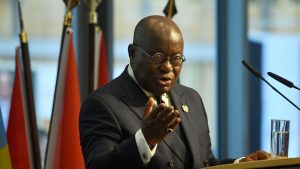The U.S., Canada, the European Union, the U.K. and the Republic of Ireland issued a joint statement Saturday condemning Nigeria’s government for banning Twitter.
Why it matters: The condemnation came a day after the country’s government threatened to arrest and prosecute any resident found using the app — which has been extremely popular in Nigeria, Africa’s most populous nation.
The action is in retaliation for the social media company temporarily freezing Nigerian President Muhammadu Buhari’s account.
Twitter and other social media platforms are routinely used by citizens around the world to voice their dissent or concerns to their governments.
What they’re saying: “We strongly support the fundamental human right of free expression and access to information as a pillar of democracy in Nigeria as around the world and these rights apply online as well as offline,” the diplomatic missions’ statement said.
“Banning systems of expression is not the answer. These measures inhibit access to information and commerce at precisely the moment when Nigeria needs to foster inclusive dialogue and expression of opinions, as well as share vital information in this time of the COVID-19 pandemic.”
Zoom in: Twitter removed a tweet posted by Buhari on Wednesday in which he vowed to punish people in the country’s southeastern region after recent attacks on public infrastructure.
The company then froze Buhari’s account, saying he violated its “abusive behavior” policy, and the government in turn banned its citizens from using the app.
The big picture: Nigeria’s Attorney General and Minister of Justice, Abubakar Malami, directed the country’s communications regulator and federal prosecutors on Saturday to start charging and arresting people who circumvent the ban through virtual private networks, according to CNN.
What they’re saying: Umar Jibrilu Gwandu, a spokesperson for the attorney general, told CNN on Saturday that any “violator, whether individuals or organizations, will be prosecuted.”
“It is the duty of prosecutors to find out modalities of getting out those who violate,” he continued.
“Every freedom has certain responsibilities — corresponding responsibility to the freedoms. No freedom is absolute. Those who are apprehended will get to know what sort of prosecution awaits them.”







